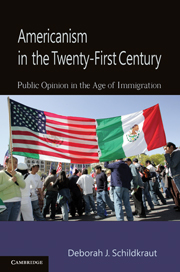Book contents
- Frontmatter
- Contents
- Figures and Tables
- Acknowledgments
- 1 Introduction: American Identity in the Twenty-First Century
- 2 The Twenty-First-Century Americanism Survey
- 3 Defining American Identity in the Twenty-First Century
- 4 Policy Implications of Multidimensional Americanism
- 5 The Myths and Realities of Identity Prioritization
- 6 Does “Becoming American” Create a “Better” American?
- 7 Immigrant Resentment: When the Work Ethic Backfires
- 8 The Politics of American Identity
- Appendix A 21-CAS Survey Questions
- Appendix B Supplementary Tables from Chapter 3
- Appendix C Supplementary Tables from Chapter 5
- Appendix D Supplementary Tables from Chapter 6
- Appendix E Supplementary Tables from Chapter 7
- References
- Index
2 - The Twenty-First-Century Americanism Survey
Published online by Cambridge University Press: 05 June 2012
- Frontmatter
- Contents
- Figures and Tables
- Acknowledgments
- 1 Introduction: American Identity in the Twenty-First Century
- 2 The Twenty-First-Century Americanism Survey
- 3 Defining American Identity in the Twenty-First Century
- 4 Policy Implications of Multidimensional Americanism
- 5 The Myths and Realities of Identity Prioritization
- 6 Does “Becoming American” Create a “Better” American?
- 7 Immigrant Resentment: When the Work Ethic Backfires
- 8 The Politics of American Identity
- Appendix A 21-CAS Survey Questions
- Appendix B Supplementary Tables from Chapter 3
- Appendix C Supplementary Tables from Chapter 5
- Appendix D Supplementary Tables from Chapter 6
- Appendix E Supplementary Tables from Chapter 7
- References
- Index
Summary
Uncovering the causes of attitudes, particularly those related to identities, is always challenging, and a public opinion survey is in some ways an imperfect tool for doing so. Scholars are often confronted with the trade-offs between generalizability and depth of insight. Surveys rely in large part on the “top of the head” responses people offer when asked about how they view themselves vis-à-vis their ethnic and nationality groups rather than on extended reflection. Yet those first responses reveal much about the relative salience of different identity choices; the fact that they regularly emerge as significant predictors of policy opinions and as the product of stable social and demographic factors suggests they are more than superficial. Surveys also remain the best method for interviewing large numbers of people from a variety of backgrounds, testing whether the patterns of their responses are statistically significant, and generalizing from those patterns to the broader population.
Some of the causal relationships under investigation throughout this study are straightforward, such as which demographic factors affect what someone thinks it means to be an American, or to what extent perceiving discrimination affects trust in government. Others are less tractable, such as the relationship between immigrant resentment and different conceptions of American national identity, whether the ethnic makeup of one's community causes certain attitudes, or whether the attitudes determine where a person chooses to live. But even in cases in which determining causality is difficult or in which a more exploratory approach is used, meaningful associations can still be investigated. For instance, knowing the association between certain community contexts and particular patterns of beliefs is valuable, even if we have trouble determining which one is the chicken and which one is the egg. Such exploratory insights can suggest avenues for future research by using alternative methods and can provide guidance for designing public policies that meet the challenge of simultaneously being accepted by the public, effective at achieving their aims, and respectful of the needs of different groups in society.
- Type
- Chapter
- Information
- Americanism in the Twenty-First CenturyPublic Opinion in the Age of Immigration, pp. 22 - 33Publisher: Cambridge University PressPrint publication year: 2010



